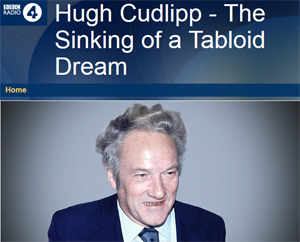Hugh Cudlipp – The Sinking of a Tabloid Dream
Posted by Prof Ian Hargreaves

Hugh Cudlipp, maestro of the Daily Mirror in the 1960s, was born in Cardiff a hundred years ago this year. His reputation as the greatest popular newspaper man of the 20th century stands pretty much unchallenged, presiding as he did over the best selling newspaper in the world in a manner that brilliantly combined seriousness of purpose with liveliness of execution.
Hugh is special to us here at JOMEC in all sorts of ways, not least because we look after his personal archive. I was able to dig into some of that for a Radio 4 documentary in which I asked: what does Cudlipp’s legacy means to today’s tabloids? Among those answering the question is David Dinsmore, recently installed as the tenth editor of the Sun.
Cudlipp, of course, created the Sun from the moribund trade union paper the Daily Herald. I still have a copy of that first edition, dated September 15, 1964, which I remember my head teacher at Burnley Grammar School waving enthusiastically in morning assembly: “a new newspaper, born of the age we live in.”
Cudlipp’s Sun was supposedly targeted at ‘a young married couple in Reading’ but as former Mirror editor Roy Greenslade and Ruth Dudley Edwards tell us in the documentary, Cudlipp got it wrong. Five years later, the struggling Sun was sold to Rupert Murdoch as a stablemate for his News of the World. Ten years after, in 1978, the Sun overtook the Mirror and in 1988, at the funeral of his colleague and friend Sydney Jacobson, Cudlipp pronounced “the dawn of the Dark Ages of tabloid journalism,” now (he said) engulfed by xenophobia, prurience and sleaze.
Given the recent history of the tabloids, Cudlipp’s words have acquired the status of prophecy, but in the documentary I revisit a moment in my own career, when I was editor of the Independent in the mid 1990s, sharing offices and presses with the Mirror. It was an experience that made two strong and contending impressions. It deepened my belief that our national newspapers would, one day, have to respect their own editorial code of practice to protect people against journalistic misbehaviour, but it also sharpened my respect for the work that tabloid papers do.
I also had a feeling that the period of Cudlipp’s greatness was as much to do with the period as with the man. These are the themes the documentary explores, helped by Professor John Hartley, now based in Australia, but one time Head of JOMEC. We also hear from Graham Johnson, a tearaway tabloid reporter whose recent book Hack lifts the lid on tools of the tabloid trade.
Whichever line you take on this, it can’t be denied that our tabloid newspapers are in difficulty. The top-selling Sun’s circulation is half that of the Mirror’s in its heyday and, with the exception of the Daily Mail, the tabloids have struggled to find their voice and a viable business model online, where they meet head to head gale-force winds of competition for celebrity and tabloid glamour. Lady Gaga’s followership on Twitter, at over 40 million, is six times the combined daily sale of all of Britain’s national newspapers. Roy Greenslade tells us that the game is up for popular newspapers, deserted by readers and advertisers. David Dinsmore says his recipe for the Sun is pretty much the same as Cudlipp’s in the 1960s: cheeky, trouble-making, campaigning, but with plenty of sport, entertainment and celebrity, on and off-line.
But let’s go back to Cudlipp. Here’s how he announced his intentions for the Sun in 1964. The new paper he said would be politically independent and favourably disposed towards modernisation “regardless of the vested interests of managements or workers.” It would be “a newspaper with a social conscience. A radical paper, ready to praise or criticise without preconceived bias. Championing progressive ideas. Fighting injustice. Exposing cruelty and exploitation … a paper for those with a zest for living.”
I don’t know about you, but I still wouldn’t mind one of those.
Hugh Cudlipp – The Sinking of a Tabloid Dream is available on iPlayer

